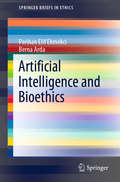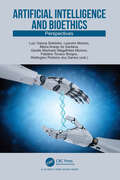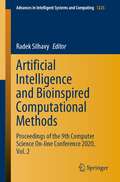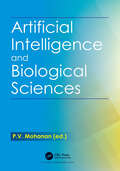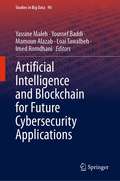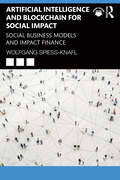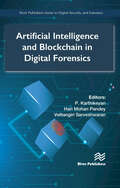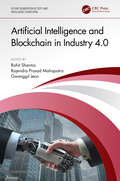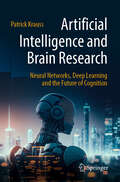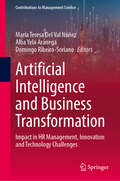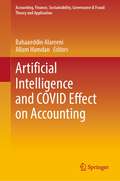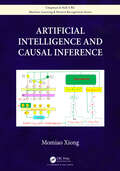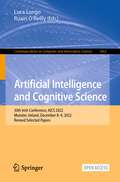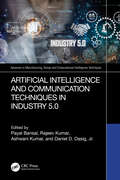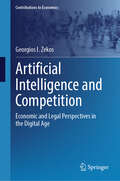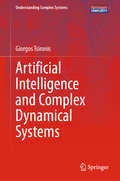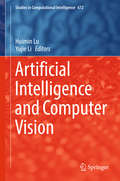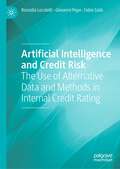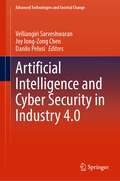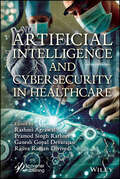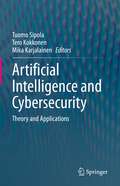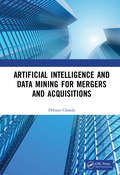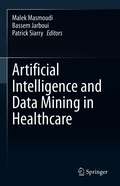- Table View
- List View
Artificial Intelligence and Bioethics (SpringerBriefs in Ethics)
by Perihan Elif Ekmekci Berna ArdaThis book explores major bioethical issues emerging from the development and use of artificial intelligence in medical settings. The authors start by defining the past, present and future of artificial intelligence in medical settings and then proceed to address the resulting common and specific bioethical inquiries. The book discusses bioethical inquiries in two separate sets. The first set is comprised of ontological discussions mainly focusing on personhood and being an ethical agent of an artefact. The second set discusses bioethical issues resulting from the use of artificial intelligence. It focuses particularly on the area of artificial intelligence use in medicine and health services. It addresses the main challenges by considering fundamental principles of medical ethics, including confidentiality, privacy, compassion, veracity and fidelity. Finally, the authors discuss the ethical implications of involvement of artificial intelligence agents in patient care by expanding on communication skills in a case-based approach. The book is of great interest to ethicists, medical professionals, academicians, engineers and scientists working with artificial intelligence.
Artificial Intelligence and Bioethics: Perspectives
by Wellington Pinheiro dos Santos Maíra Araújo de Santana Leandro Modolo Luiz Vianna Sobrinho Giselle Machado Magalhães Moreno Fabiano Tonaco BorgesThe fourth industrial revolution challenges humanity ethically and morally: mass unemployment, new forms of colonialism, and mass-and-granular surveillance are a few examples of these challenges. Nevertheless, the industrial revolutions have increased human productivity and quality of life. This book aims to review the ethical challenges related to the use of these technologies. It unfolds bioethical perspectives regarding Artificial Intelligence (AI) and its impact on life on earth. It discusses both northern and southern epistemologies of bioethics. Northern bioethics comprises principles of autonomy, beneficence, non-maleficence, and justice. Southern bioethics gives weightage to struggles for human liberation, social justice, and the pluralism of knowledge. The book discusses topics from aging to mass surveillance, to deliver a universal bioethical guideline to a wide range of professions that work with AI and are concerned about its impact on life. This book will not label AI, but broaden the readers' view of an ethical and explainable AI that works for life on earth.
Artificial Intelligence and Bioinspired Computational Methods: Proceedings of the 9th Computer Science On-line Conference 2020, Vol. 2 (Advances in Intelligent Systems and Computing #1225)
by Radek SilhavyThis book gathers the refereed proceedings of the Artificial Intelligence and Bioinspired Computational Methods Section of the 9th Computer Science On-line Conference 2020 (CSOC 2020), held on-line in April 2020.Artificial intelligence and bioinspired computational methods now represent crucial areas of computer science research. The topics presented here reflect the current discussion on cutting-edge hybrid and bioinspired algorithms and their applications.
Artificial Intelligence and Biological Sciences
by P. V. MohananAdvancements of AI in medical and biological sciences have opened new ways for drug development. Novel therapeutic molecules and their target action can be easily predicted and can be modified. AI helps in disease detection and diagnosis faster. The breakthrough of AI is made especially in the area of personalized precision medicine, host-pathogen interaction and predictive epidemiology. These approaches could help in faster decision-making with minimal errors that can improve risk analysis, especially disease diagnosis and selecting treatment strategy. In agricultural practices, an exact combination of fertilizers, pesticides, herbicides, soil management, water requirement analysis, yield prediction and overall crop management can be modified by implementing AI interventions. AI could provide a better improvement in agriculture, medical research, pharmaceuticals and bio-based industries for a sustainable life.The key features of this book are: AI in medical Sciences, biotechnology and drug discovery; Application of AI in Digital Pathology, cytology and bioinformatics; Overview of AI, Machine Learning and Deep Learning; Impact of Artificial Intelligence in Society; Artificial Intelligence in Pharmacovigilance; and Ethics in Artificial Intelligence. The volume aims to comprehensively cover the application of AI in biological sciences. It is a collection of contributions from different authors who have several years of experience in their specific areas. The book will be useful for pharma companies, CROs, product developers, students, researchers, academicians, policymakers and practitioners.
Artificial Intelligence and Blockchain for Future Cybersecurity Applications (Studies in Big Data #90)
by Imed Romdhani Yassine Maleh Mamoun Alazab Youssef Baddi Loai TawalbehThis book presents state-of-the-art research on artificial intelligence and blockchain for future cybersecurity applications. The accepted book chapters covered many themes, including artificial intelligence and blockchain challenges, models and applications, cyber threats and intrusions analysis and detection, and many other applications for smart cyber ecosystems. It aspires to provide a relevant reference for students, researchers, engineers, and professionals working in this particular area or those interested in grasping its diverse facets and exploring the latest advances on artificial intelligence and blockchain for future cybersecurity applications.
Artificial Intelligence and Blockchain for Social Impact: Social Business Models and Impact Finance
by Wolfgang Spiess-KnaflArtificial Intelligence and Blockchain for Social Impact provides an accessible overview of artificial intelligence (AI) and blockchain technologies, and explores their applications for social enterprise and impact investing. The opening chapter introduces the impact space, exploring different social business models, the role of technology, the impact investing market and general problems in the space. The remainder of this book falls into two paths: the first focusing on AI and the other looking at the blockchain technology. Providing introductions to each of these technologies and their histories, the author goes on to examine them from the perspectives of social business models and impact finance. A concluding chapter explores AI and cryptocurrencies in the impact space in the future. Readers are supported with international case studies and other student-friendly features. Situated at the intersection between technology, fintech, social enterprise, impact investing and social impact, this book is a valuable resource for upper-level courses across all these areas. It also offers an introduction to this emerging topic for researchers and business professionals. Online teaching resources to accompany this book include instructor lecture slides and data sets.
Artificial Intelligence and Blockchain in Digital Forensics (River Publishers Series in Digital Security and Forensics)
by P. Karthikeyan Hari Mohan Pandey Velliangiri SarveshwaranDigital forensics is the science of detecting evidence from digital media like a computer, smartphone, server, or network. It provides the forensic team with the most beneficial methods to solve confused digital-related cases. AI and blockchain can be applied to solve online predatory chat cases and photo forensics cases, provide network service evidence, custody of digital files in forensic medicine, and identify roots of data scavenging. The increased use of PCs and extensive use of internet access, have meant easy availability of hacking tools. Over the past two decades, improvements in the information technology landscape have made the collection, preservation, and analysis of digital evidence extremely important. The traditional tools for solving cybercrimes and preparing court cases are making investigations difficult. We can use AI and blockchain design frameworks to make the digital forensic process efficient and straightforward. AI features help determine the contents of a picture, detect spam email messages and recognize swatches of hard drives that could contain suspicious files. Blockchain-based lawful evidence management schemes can supervise the entire evidence flow of all of the court data. This book provides a wide-ranging overview of how AI and blockchain can be used to solve problems in digital forensics using advanced tools and applications available on the market.
Artificial Intelligence and Blockchain in Industry 4.0 (Future Generation of Soft and Intelligent Computing)
by Rohit Sharma Rajendra Prasad Mahapatra Gwanggil JeonThe book addresses the challenges in designing blockchain-based secured solutions for Industry 4.0 applications using artificial intelligence. It further provides a comparative analysis of various advanced security approaches such as edge computing, cybersecurity, and cloud computing in the realm of information technology. This book: • Address the challenges in designing blockchain-based secured solutions for Industry 4.0 applications using artificial intelligence • Provides a comparative analysis of various advanced security approaches such as edge computing, cybersecurity, and cloud computing in the realm of information technology • Discusses the evolution of blockchain and artificial intelligence technology, from fundamental theories to practical aspects • Illustrates the most recent research solutions that handle the security and privacy threats while considering the resource-constrained in Industry 4.0 devices • Showcases the methods and tools necessary for intelligent data analysis and gives solutions to problems resulting from automated data collection The text aims to fill the gap between the theories of blockchain and its practical application in business, government, and defense among other areas. It further highlights the challenges associated with the use of blockchain for various industry 4.0 applications such as data analytics, software-defined networks, cyber-physical systems, drones, and cybersecurity. The text is primarily written for senior undergraduate, graduate students, and academic researchers in the fields of electrical engineering, electronics and communication engineering, computer engineering, manufacturing engineering, and industrial engineering.
Artificial Intelligence and Brain Research: Neural Networks, Deep Learning and the Future of Cognition
by Patrick KraussHow does artificial intelligence (AI) work and are there parallels to the human brain? What do natural and artificial intelligence have in common, and what are the differences? Is the brain nothing more than a biological computer? What are neural networks and how can the term deep learning be explained simply?Since the cognitive revolution in the middle of the last century, AI and brain research have been closely intertwined. There have been several spectacular breakthroughs in the field of AI in recent years, from alphaGo to DALL-E 2 and ChatGPT, which were completely unthinkable until recently. However, researchers are already working on the innovations of tomorrow, such as hybrid machine learning or neuro-symbolic AI. But what does this actually mean?Based on current research findings and exciting practical examples, this non-fiction book provides an understandable introduction to the basics and challenges of these fascinating disciplines. You will learn what neuroscience and psychology know about how the brain works and how artificial intelligence works. You will also learn how AI has revolutionized our understanding of the brain and how findings from brain research are used in computer science to further develop AI algorithms. Discover the fascinating world of these two disciplines. Find out why artificial intelligence and brain research are two sides of the same coin and how they will shape our future.
Artificial Intelligence and Business Transformation: Impact in HR Management, Innovation and Technology Challenges (Contributions to Management Science)
by María Teresa Del Val Núñez Alba Yela Aránega Domingo Ribeiro-SorianoThis book offers a current perspective on Artificial Intelligence in the context of an ever-changing and growing technological revolution in business management. It analyses how existing companies are adapting, new ones are emerging, and others are disappearing. Process re-engineering has made it possible to reshape organizational structures and create new departments and positions, all geared towards digitalization. The emergence of new business functions has led to new strategic thinking on e.g. companies’ structure, size, and core business – but also to the creation of new jobs, the need to cover digital skills, and the need for innovative team management. In short, it is a question of delving deeper into HR and the impact that digitalization has had on it, as the employee is one of the key figures to protect. The book initially focuses on providing a review of the current literature on the advancement of Artificial Intelligence and its impact on business transformation and the emergence of new management models. In turn, it addresses the diverse perspectives that currently dominate the business market, as well as the corporate transformations that have taken place in the post-pandemic era. Lastly, it equips employers with new tools to incorporate into their organizations, facilitating talent retention. In connection with HR, this digital transformation is reflected in new roles for change management and cultural transformation, including the use of digital technologies to improve the employee experience. In brief, the book offers a practical guide to business transformation, technological advances, and their application in human resources departments.
Artificial Intelligence and COVID Effect on Accounting (Accounting, Finance, Sustainability, Governance & Fraud: Theory and Application)
by Allam Hamdan Bahaaeddin AlareeniThis book considers the effects of COVID-19 on accounting, particularly with regard to the role of artificial intelligence in accounting in the post-pandemic business environment. The contributions in the book consider a variety of sectors that have been affected by the pandemic, such as the stock market, forensic accounting, Bitcoin, as well as the economic and educational responses to the pandemic and the aftermath felt by both developing and developed countries. This book will be a valuable read for academics, students and practitioners of accounting who are keen to explore the future of the field in light of the pandemic.
Artificial Intelligence and Causal Inference
by Momiao XiongArtificial Intelligence and Causal Inference address the recent development of relationships between artificial intelligence (AI) and causal inference. Despite significant progress in AI, a great challenge in AI development we are still facing is to understand mechanism underlying intelligence, including reasoning, planning and imagination. Understanding, transfer and generalization are major principles that give rise intelligence. One of a key component for understanding is causal inference. Causal inference includes intervention, domain shift learning, temporal structure and counterfactual thinking as major concepts to understand causation and reasoning. Unfortunately, these essential components of the causality are often overlooked by machine learning, which leads to some failure of the deep learning. AI and causal inference involve (1) using AI techniques as major tools for causal analysis and (2) applying the causal concepts and causal analysis methods to solving AI problems. The purpose of this book is to fill the gap between the AI and modern causal analysis for further facilitating the AI revolution. This book is ideal for graduate students and researchers in AI, data science, causal inference, statistics, genomics, bioinformatics and precision medicine. Key Features: Cover three types of neural networks, formulate deep learning as an optimal control problem and use Pontryagin’s Maximum Principle for network training. Deep learning for nonlinear mediation and instrumental variable causal analysis. Construction of causal networks is formulated as a continuous optimization problem. Transformer and attention are used to encode-decode graphics. RL is used to infer large causal networks. Use VAE, GAN, neural differential equations, recurrent neural network (RNN) and RL to estimate counterfactual outcomes. AI-based methods for estimation of individualized treatment effect in the presence of network interference.
Artificial Intelligence and Cognitive Science: 30th Irish Conference, AICS 2022, Munster, Ireland, December 8–9, 2022, Revised Selected Papers (Communications in Computer and Information Science #1662)
by Luca Longo Ruairi O’ReillyThis open access book constitutes selected papers presented during the 30th Irish Conference on Artificial Intelligence and Cognitive Science, held in Munster, Ireland, in December 2022. The 41 presented papers were thoroughly reviewed and selected from the 102 submissions. They are organized in topical sections on machine learning, deep learning and applications; responsible and trustworthy artificial intelligence; natural language processing and recommender systems; knowledge representation, reasoning, optimisation and intelligent applications.
Artificial Intelligence and Communication Techniques in Industry 5.0 (Advances in Manufacturing, Design and Computational Intelligence Techniques)
by Ashwani Kumar Rajeev Kumar Daniel D. Dasig Payal BansalThe book highlights the role of artificial intelligence in driving innovation, productivity, and efficiency. It further covers applications of artificial intelligence for digital marketing in Industry 5.0 and discusses data security and privacy issues in artificial intelligence, risk assessments, and identification strategies.This book: Discusses the role of artificial intelligence applications for digital manufacturing in Industry 5.0 Presents blockchain methods and data-driven decision-making with autonomous transportation Covers reinforcement learning algorithm and highly predicted models for accurate data analysis in industry automation Highlights the importance of robust authentication mechanisms and access control policies to protect sensitive information, prevent unauthorized access, and enable secure interactions between humans and machines Explains attack pattern detection and prediction which play a crucial role in ensuring the security of business systems and networks It is primarily written for senior undergraduates, graduate students, and academic researchers in the fields of electrical engineering, electronics and communication engineering, computer engineering, industrial engineering, manufacturing engineering, and production engineering.
Artificial Intelligence and Competition: Economic and Legal Perspectives in the Digital Age (Contributions to Economics)
by Georgios I. ZekosThis book examines the impact of artificial intelligence on competition and antitrust in today's global digital economy. It scrutinizes the economic and legal ramifications of Artificial Intelligence (AI), addressing the challenges it presents to competition and the law.Beginning with an analysis of AI's developments across various economic sectors, the book highlights the need for updated legislation. It focuses on the digital economy, emphasizing digital platforms' role in shaping competition. Econometric investigations and a novel index assess competition's influence on foreign direct investment and multinational enterprises. Comparing competition practices across jurisdictions like the EU, US, Germany, and China, the book uncovers commonalities and differences in competition law principles. It also explores various theories on competition and competition law, seeking convergence or divergence.This book is an essential resource for scholars, legal professionals, policymakers, and anyone seeking a better understanding of how AI is reshaping competition and antitrust in the digital age.
Artificial Intelligence and Complex Dynamical Systems (Understanding Complex Systems)
by Giorgos TsironisThis book serves as a comprehensive introduction to nonlinear complex systems through the application of machine learning methods. Artificial intelligence (AI) has affected the foundations of scientific discovery, and can therefore lend itself to developing a better understanding of the unpredictable nature of complex dynamical systems and to predict their future evolution. Utilizing Python code, this book teaches and applies machine learning to topics such as chaotic dynamics and time-series analysis, solitons, breathers, chimeras, nonlinear localization, biomolecular dynamics, and wave propagation in the heart. The consistent integration of methods and models allow for readers to develop a necessary intuition on how to handle complexity through AI. This textbook contains a wealth of expository material, code, and example problems to support and organize academic coursework, allowing the technical nature of these areas of study to become highly accessible. Requiring only a basic background in mathematics and coding in Python, this book is an essential text for a wide array of advanced undergraduate or graduate students in the applied sciences interested in complex systems through the lens of machine learning.
Artificial Intelligence and Computer Vision (Studies in Computational Intelligence #672)
by Huimin Lu Yujie LiThis edited book presents essential findings in the research fields of artificial intelligence and computer vision, with a primary focus on new research ideas and results for mathematical problems involved in computer vision systems. The book provides an international forum for researchers to summarize the most recent developments and ideas in the field, with a special emphasis on the technical and observational results obtained in the past few years.
Artificial Intelligence and Conservation (Artificial Intelligence for Social Good)
by Milind Tambe Fei Fang Bistra Dilkina Andrew J. PlumptreWith the increasing public interest in artificial intelligence (AI), there is also increasing interest in learning about the benefits that AI can deliver to society. This book focuses on research advances in AI that benefit the conservation of wildlife, forests, coral reefs, rivers, and other natural resources. It presents how the joint efforts of researchers in computer science, ecology, economics, and psychology help address the goals of the United Nations' 2030 Agenda for Sustainable Development. Written at a level accessible to conservation professionals and AI researchers, the book offers both an overview of the field and an in-depth view of how AI is being used to understand patterns in wildlife poaching and enhance patrol efforts in response, covering research advances, field tests and real-world deployments. The book also features efforts in other major conservation directions, including protecting natural resources, ecosystem monitoring, and bio-invasion management through the use of game theory, machine learning, and optimization.
Artificial Intelligence and Credit Risk: The Use of Alternative Data and Methods in Internal Credit Rating
by Rossella Locatelli Giovanni Pepe Fabio SalisThis book focuses on the alternative techniques and data leveraged for credit risk, describing and analysing the array of methodological approaches for the usage of techniques and/or alternative data for regulatory and managerial rating models. During the last decade the increase in computational capacity, the consolidation of new methodologies to elaborate data and the availability of new information related to individuals and organizations, aided by the widespread usage of internet, set the stage for the development and application of artificial intelligence techniques in enterprises in general and financial institutions in particular. In the banking world, its application is even more relevant, thanks to the use of larger and larger data sets for credit risk modelling. The evaluation of credit risk has largely been based on client data modelling; such techniques (linear regression, logistic regression, decision trees, etc.) and data sets (financial, behavioural, sociologic, geographic, sectoral, etc.) are referred to as “traditional” and have been the de facto standards in the banking industry. The incoming challenge for credit risk managers is now to find ways to leverage the new AI toolbox on new (unconventional) data to enhance the models’ predictive power, without neglecting problems due to results’ interpretability while recognizing ethical dilemmas. Contributors are university researchers, risk managers operating in banks and other financial intermediaries and consultants. The topic is a major one for the financial industry, and this is one of the first works offering relevant case studies alongside practical problems and solutions.
Artificial Intelligence and Cyber Security in Industry 4.0 (Advanced Technologies and Societal Change)
by Joy Iong-Zong Chen Danilo Pelusi Velliangiri SarveshwaranThis book provides theoretical background and state-of-the-art findings in artificial intelligence and cybersecurity for industry 4.0 and helps in implementing AI-based cybersecurity applications. Machine learning-based security approaches are vulnerable to poison datasets which can be caused by a legitimate defender's misclassification or attackers aiming to evade detection by contaminating the training data set. There also exist gaps between the test environment and the real world. Therefore, it is critical to check the potentials and limitations of AI-based security technologies in terms of metrics such as security, performance, cost, time, and consider how to incorporate them into the real world by addressing the gaps appropriately. This book focuses on state-of-the-art findings from both academia and industry in big data security relevant sciences, technologies, and applications.
Artificial Intelligence and Cybersecurity in Healthcare
by Rashmi Agrawal Pramod Singh Rathore Rajiva Ranjan Divivedi Ganesh Gopal DevarajanArtificial Intelligence and Cybersecurity in Healthcare provides a crucial exploration of AI and cybersecurity within healthcare Cyber Physical Systems (CPS), offering insights into the complex technological landscape shaping modern patient care and data protection. As technology advances, healthcare has transformed, particularly through the implementation of CPS that integrate the digital and physical worlds, enhancing system efficiency and effectiveness. This increased reliance on technology raises significant security concerns. The book addresses the integration of AI and cybersecurity in healthcare CPS, detailing technological advancements, applications, and the challenges they present. AI applications in healthcare CPS include remote patient monitoring, AI chatbots for patient assistance, and biometric authentication for data security. AI not only improves patient care and clinical decision-making by analyzing extensive data and optimizing treatment plans, but also enhances CPS security by detecting and responding to cyber threats. Nonetheless, AI systems are susceptible to attacks, emphasizing the need for robust cybersecurity. Significant issues include the privacy and security of sensitive healthcare data, potential identity theft, and medical fraud from data breaches, alongside ethical concerns such as algorithmic bias. As the healthcare industry becomes increasingly digital and data-driven, integrating AI and cybersecurity measures into CPS is essential. This requires collaboration among healthcare providers, tech vendors, regulatory bodies, and cybersecurity experts to develop best practices and standards. This book aims to provide a comprehensive understanding of AI, cybersecurity, and healthcare CPS. It explores technologies like augmented reality, blockchain, and the Internet of Things, addressing associated challenges like cybersecurity threats and ethical dilemmas.
Artificial Intelligence and Cybersecurity: Advances and Innovations (Green Engineering and Technology)
by Ishaani Priyadarshini and Rohit SharmaArtificial intelligence and cybersecurity are two emerging fields that have made phenomenal contributions toward technological advancement. As cyber-attacks increase, there is a need to identify threats and thwart attacks. This book incorporates recent developments that artificial intelligence brings to the cybersecurity world. Artificial Intelligence and Cybersecurity: Advances and Innovations provides advanced system implementation for Smart Cities using artificial intelligence. It addresses the complete functional framework workflow and explores basic and high-level concepts. The book is based on the latest technologies covering major challenges, issues and advances, and discusses intelligent data management and automated systems. This edited book provides a premier interdisciplinary platform for researchers, practitioners and educators. It presents and discusses the most recent innovations, trends and concerns as well as practical challenges and solutions adopted in the fields of artificial intelligence and cybersecurity.
Artificial Intelligence and Cybersecurity: Theory and Applications
by Tuomo Sipola Tero Kokkonen Mika KarjalainenThis book discusses artificial intelligence (AI) and cybersecurity from multiple points of view. The diverse chapters reveal modern trends and challenges related to the use of artificial intelligence when considering privacy, cyber-attacks and defense as well as applications from malware detection to radio signal intelligence.The chapters are contributed by an international team of renown researchers and professionals in the field of AI and cybersecurity.During the last few decades the rise of modern AI solutions that surpass humans in specific tasks has occurred. Moreover, these new technologies provide new methods of automating cybersecurity tasks. In addition to the privacy, ethics and cybersecurity concerns, the readers learn several new cutting edge applications of AI technologies.Researchers working in AI and cybersecurity as well as advanced level students studying computer science and electrical engineering with a focus on AI and Cybersecurity will find this book useful as a reference. Professionals working within these related fields will also want to purchase this book as a reference.
Artificial Intelligence and Data Mining for Mergers and Acquisitions
by Debasis ChandaThe goal of this book is to present a modeling framework for the Virtual Organization that is focused on process composition. This framework uses Predicate Calculus Knowledge Bases. Petri Net-based modeling is also discussed. In this context, a Data Mining model is proposed, using a fuzzy mathematical approach, aiming to discover knowledge. A Knowledge-Based framework has been proposed in order to present an all-inclusive knowledge store for static and dynamic properties. Toward this direction, a Knowledge Base is created, and inferences are arrived at. This book features an advisory tool for Mergers and Acquisitions of Organizations using the Fuzzy Data Mining Framework and highlights the novelty of a Knowledge-Based Service-Oriented Architecture approach and development of an Enterprise Architectural model using AI that serves a wide audience. Students of Strategic Management in business schools and postgraduate programs in technology institutes seeking application areas of AI and Data Mining, as well as business/technology professionals in organizations aiming to create value through Mergers and Acquisitions and elsewhere, will benefit from the reading of this book.
Artificial Intelligence and Data Mining in Healthcare
by Patrick Siarry Bassem Jarboui Malek MasmoudiThis book presents recent work on healthcare management and engineering using artificial intelligence and data mining techniques. Specific topics covered in the contributed chapters include predictive mining, decision support, capacity management, patient flow optimization, image compression, data clustering, and feature selection.The content will be valuable for researchers and postgraduate students in computer science, information technology, industrial engineering, and applied mathematics.
